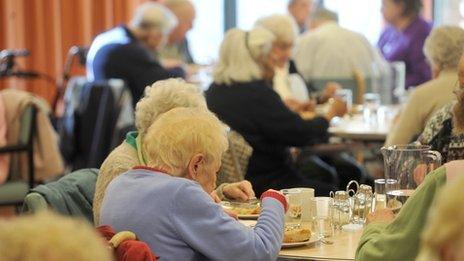'Care gaps and funding gaps'
- Published
- comments

Community projects 'try to fill the gap'
Older people are being failed by an under-funded social care system, according to Dr Ian Donald of the British Geriatrics Society.
With a white paper on social care imminent Dr Donald, who is working with Age UK, spells out in this week's Scrubbing Up how things need to change.
As a specialist for older people's health working on an acute elderly care ward in a district general hospital, I see around 1,500 patients a year.
Most are keen to return to their home, and their families are keen to resume caring for them.
Very many suffer from dementia, and most are frail, entering the last year or two of their lives.
We try to make it our practice to meet the families within a day or so of their admission to our ward - and so often we hear a story of how they are all struggling to cope.
Some have contacted social services for help and are on a waiting list because their needs are not yet judged to be urgent - sometimes it seems the only way to turn is to seek hospital admission, or more commonly wait for that crisis to occur which precipitates the emergency admission.
Sometimes that crisis was just a fall, or simple infection, but it uncovers the struggle being endured at home.
Other times the crisis is more serious - a pressure sore, fracture, or malnutrition - which could have been avoided if more timely assessment had been provided, with medical and social care working hand-in-hand.
'Keeping watch'
Many are already receiving home care, which ensures that basic personal needs are met, such as being helped up in the morning, washed and dressed.
Yet how does this support the muddled person who may well forget to drink the tea or eat the hot meal left for them?
I meet many families who are anxious about the time gaps between home visits from carers, and especially the long gap through the evening and night.
A fall or other incident can go unnoticed for hours, and soon a crisis such as immobility is created.
Some have suggested that the solution lies in technology - telecare with devices "keeping watch" for the unforeseen crisis or fall.
But this generation of older people grew up before the computer, and technology should be at most an adjunct to personal care. So many patients will stay in hospital longer than they need while we assess, review, and try to find more care to support them again.
None of this of course is to criticise social services - they have made it quite clear for some time that their resources are stretched too thinly to support the many frail or confused older people who wish to remain in their own homes.
Some may point the finger at families neglecting their duty, but my experience is that the family are usually doing all they can, often from a considerable distance away.
We need to find ways of not just meeting basic needs but improving wellbeing, reducing loneliness, and restoring some pleasure to their life.
This of course requires more time, and the development of friendship between carer and client, which is not possible in 15 minute segments of care.
Communities, churches and voluntary groups seek to fill the gap, but it is clear to all who have had personal experience of the system that social services is close to breaking point.
In addition, there are some extraordinary inequalities - one person will spend £35,000 each year, while another will receive the same care for free. This has also been described clearly by the Dilnot report.
It makes no sense to me as a doctor seeing the same considerable needs from the same devastating illnesses costing a person either nothing or their whole life savings.
I very much hope that we will find a new way of bringing more money and hence more compassionate care to the growing number of frail older people who want to end their lives at home, and I believe that most people in our society today agree with me.